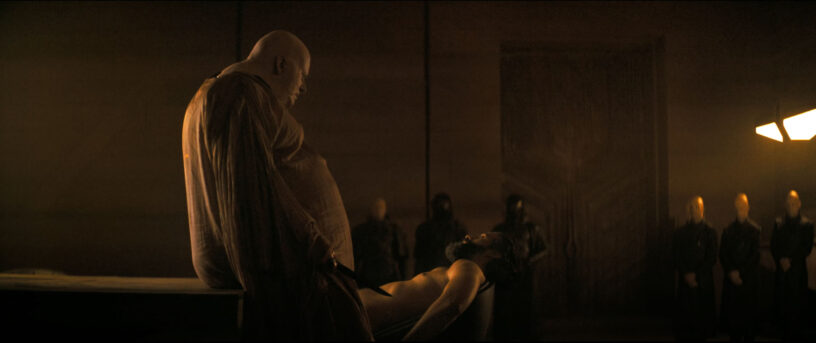In the Dune novel there are many blood relationships connecting the noble Houses, with Duke Leto Atreides being described as a distant cousin of the Emperor. There is also a surprise in the House Harkonnen bloodline, which may be revealed in Dune: Part Two, so I’ll not spoil it here for anyone who doesn’t know.
There is one line, however, in Denis Villeneuve’s Dune: Part One (2021) movie that has led to questions regarding whether Baron Vladimir Harkonnen and Duke Leto Atreides are related, such as this recent one on Reddit: Blood relationship between Duke Leto and Baron Vladimir.
You have a wonderful kitchen, cousin.
Baron Vladimir Harkonnen

This particular line is not from the novel, but it appears to have been inspired by their fateful confrontation where the Baron does refer to the Duke as “cher cousin” a number of times:
I’ve lived for a time on this planet, cher cousin. One does not spy on those ragged scum of the desert.
…
Believe me, cher cousin, I do not want it to come to this.
Baron Vladimir Harkonnen
To uncover the meaning of this phrase we need to look at a passage earlier in the novel where Piter delivers Leto’s message to the Baron.
He’s most uncouth, Baron. Addresses you as ‘Harkonnen’ – no ‘Sire et Cher Cousin,’ no title, nothing.
Piter de Vries
This doesn’t appear to shed much light on its meaning, until we refer to The Sabres of Paradise by Lesley Blanch. This novel is about the Caucasian Wars of Independence (1834-1859), and that region’s mountain tribes’ battle against the Russians.

Its influence on Frank Herbert’s Dune is well documented, such as in The Secret History of Dune article by Will Collins at the Los Angeles Review of Books.
Within its pages we encounter many words, phrases, and concepts that will be familiar to fans of Dune, including this revealing passage:
[Napoleon] had sent out the customary letters, monarch to monarch, circularizing all the European courts, addressing each ruler in the traditional format: ‘Sire et cher cousin’.
But Nicholas, the Romanov, had not deigned to consider a Bonaparte of equal blood and in replying, he rather pointedly omitted ‘Cher cousin’
Lesley Blanch, The Sabres of Paradise
We can see that Frank Herbert “borrowed” that same insult, with Duke Leto not considering the Baron to be of an equal noble bloodline. The “cher cousin” verbiage in Dune likewise has nothing to do with them being actual blood-related cousins.
While Star Wars was influenced by Dune, it is also clear that Dune was in turn influenced by The Sabres of Paradise. Latter is recommended reading for anyone who wants to uncover some of the secret origins of Dune – but more than that, The Sabres of Paradise is also a great book!



